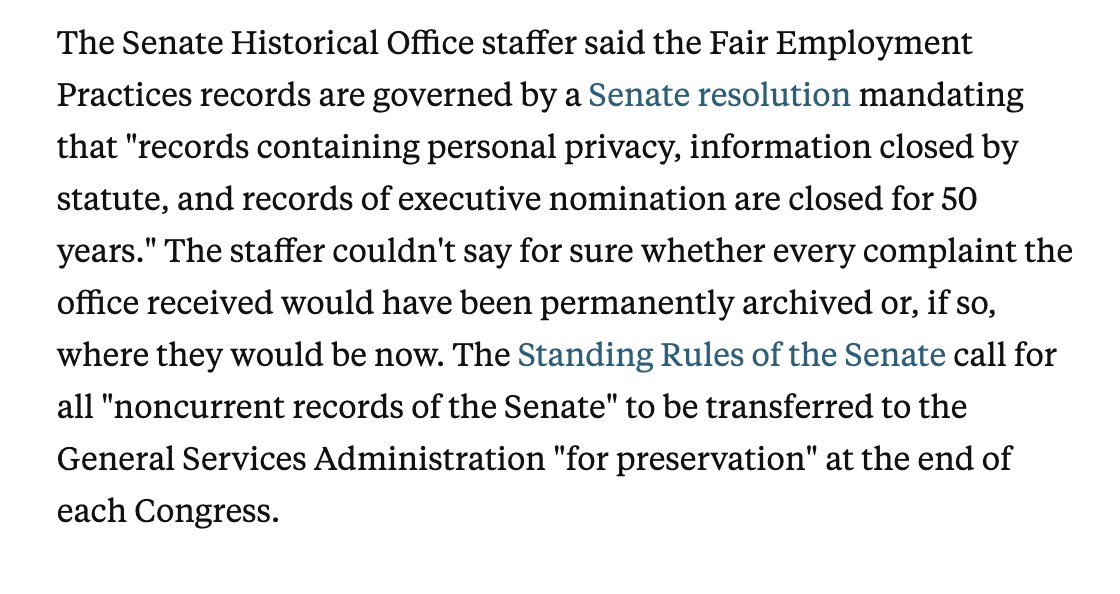Today @hannah_beckler and I launch a project over two years in the making exposing how the Eighth Amendment has been gutted for this nation's 1.2 million prisoners. Of the nearly 1,500 cases we analyzed, we found that prisoners won less than 1% of the time.businessinsider.com/eighth-amendme…
Our team of reporters & researchers read tens of thousands of pages of court documents; obtained hundreds of pages of internal corrections records; and interviewed over 170 people.
In the coming days we'll be publishing stories about our findings. We hope you give them a read.
In the coming days we'll be publishing stories about our findings. We hope you give them a read.
Our second story is out, about one of the major obstacles facing incarcerated plaintiffs: the Prison Litigation Reform Act, intended to curb what legislators described as "frivolous" suits. We found the law has instead stymied claims alleging serious harm. businessinsider.com/plra-frivolous…
When the PLRA was signed into law in 1996, its proponents said that it wouldn't affect prisoners with legitimate claims trying to access the courts — only prisoners suing for trivial matters. "The vast majority of these suits are completely without merit," Sen. Orrin Hatch said.
But the PLRA did impact prisoners with serious allegations; according to @DavidCFathi, "people who have suffered horrific harm, people who have extremely meritorious and compelling cases, get thrown out of court for reasons that have nothing to do with the merits of their case."
@DavidCFathi We detail some of those cases: for instance, in Texas, Juanita Ornelas said that she was being repeatedly sexually and physically abused by another prisoner. She sent letters to a department investigator asking for help, but she said they went unanswered.
@DavidCFathi Ornelas filed a lawsuit over the investigator’s failure to protect her. It was dismissed because she failed to properly submit prison grievances before filing suit, as is required by the PLRA.
Exhausting a prison's internal grievance system is one of the law's biggest hurdles.
Exhausting a prison's internal grievance system is one of the law's biggest hurdles.
@DavidCFathi .@ck94117 said exhaustion "definitely incentivizes prison systems to create Byzantine grievance processes."
"If you fail to meet a single deadline, or if you worded something in a way that wasn't quite specific enough, the courts will often just throw the cases out," she said.
"If you fail to meet a single deadline, or if you worded something in a way that wasn't quite specific enough, the courts will often just throw the cases out," she said.
@DavidCFathi @ck94117 The PLRA has faced criticism in the decades since its passage, and in the mid-2000s @BobbyScott introduced legislation to ease some of the law's most onerous requirements. He told BI, "it needed reform because there's so many instances where legitimate claims couldn't be heard."
@DavidCFathi @ck94117 @BobbyScott We'll have more stories from the series pubbing this weekend. Stay tuned! businessinsider.com/plra-frivolous…
Our third story in the series is about a legal standard that you've probably never heard about, that's made it nearly impossible for incarcerated plaintiffs to assert their Eighth Amendment rights. It's called the "deliberate indifference" standard. businessinsider.com/deliberate-ind…
Deliberate indifference was first introduced by the Supreme Court in the 1970s. Then, in the 1990s, the Court decided that prison officials could only be liable for Eighth Amendment violations if they were aware of and disregarded a serious risk — regardless of the actual harm.
In other words, the standard required incarcerated plaintiffs to marshal proof of something ineffable — a prison official's inner thoughts. 
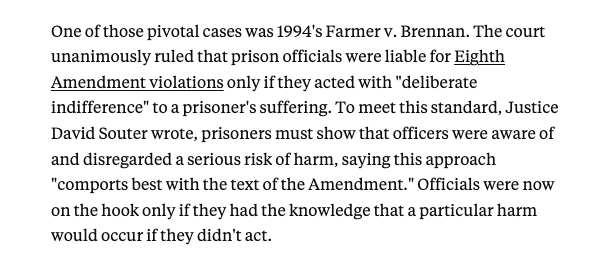
There were warnings at the time: officials could "argue to the jury that although a particular risk of harm was plainly obvious, and a reasonable prison official would have been aware of it, he wasn't," Michelle Alexander, then a clerk for Justice Blackmun, pointed out. 
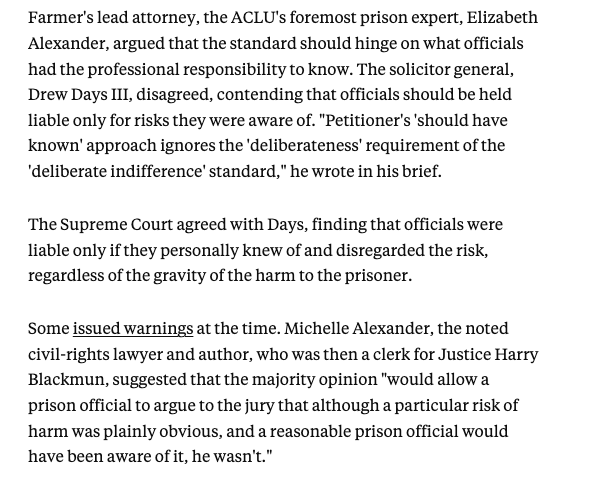
In the decades since, we found that judges have dismissed cases alleging untreated cancers and heart diseases, retaliatory beatings, sexual assaults, limb amputations, and wasting away in squalid cells — because prisoners failed to overcome the deliberate-indifference standard. 

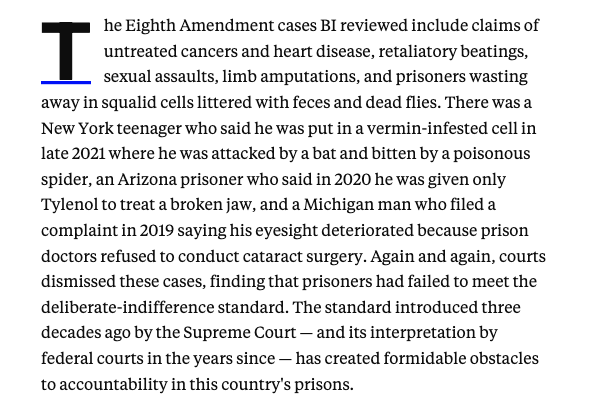

If prisoners encounter conditions that are "inhumane, unhealthy, dangerous, or even lethal," @DavidCFathi argued, "that should be enough to violate the Eighth Amendment — you shouldn't have to go looking for someone who was thinking bad thoughts.”
@DavidCFathi We specifically focused our reporting on a Minnesota prison called Rush City; officers and prisoners told us that the facility's routine brutality earned it a moniker: Gladiator School. But, despite the frequent violence, one assault has stood out. 
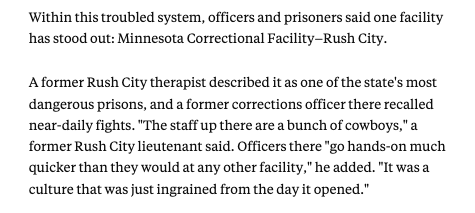
@DavidCFathi In 2012, while folding balloons in the industry area, James Vandevender was violently assaulted when another prisoner swung at his head repeatedly with a four-by-four wooden post. The attack was devastating; over a decade later he still struggles with the effects of the TBI. 

@DavidCFathi Years later, David Hodges was also assaulted by prisoners at Rush City — after he and his family had begged officials to move him because he feared that he’d be attacked. Despite their pleas, he wasn’t moved to a new unit; one officer said he didn’t believe he faced any threats.
@DavidCFathi Both Vandevender and Hodges filed lawsuits alleging that their Eighth Amendment rights had been violated; both men lost their cases because they couldn’t prove that officials had acted with deliberate indifference.
@DavidCFathi "Our caselaw may set the bar too high for the typical inmate to sufficiently plead prison officials were deliberately indifferent to a substantial risk of serious harm in a case like this one," circuit judge Jane Kelly acknowledged in a concurring opinion in Vandevender's case.
@DavidCFathi We also learned that many corrections officers are made aware of the mindset standard. We obtained training materials from 37 states and found that most explicitly trained on deliberate indifference. We’ve made those materials public at this link: documentcloud.org/projects/22006…
@DavidCFathi More soon! And please give this one a read: businessinsider.com/deliberate-ind…
• • •
Missing some Tweet in this thread? You can try to
force a refresh


